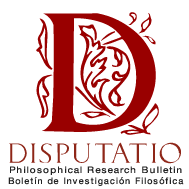Mirela Oliva
University of St. Thomas, USA | olivam@stthom.edu
Received: 28-November-2019 | Accepted: 21-December-2019 | Published: 31-December-2019
Disputatio [Dec. 2019], Vol. 8, No. 11, pp. 469–494 | DOI: 10.5281/zenodo.3596157
Article | [SP] | Full Text | Statistics | Copyright Notice [sp] | Vol. 8 No. 11
How to cite this article:
Oliva, Mirela (2019). «The Relational Nature of the Meaning of Life in Nozick». Disputatio. Philosophical Research Bulletin 8, no. 11: pp. 469–494.
Abstract | Nozick claims that the quest for the meaning of life entails a relational account of meaning. I defend his claim and show that the meaning of life is not one value among many but rather represents the connectedness of all aspects of human life. The meaning of life is a transcending of our limits towards value. This account leads Nozick to a theistic conclusion: the ultimate meaning of life can be only something that has no further meaning and is its meaning, namely the Unlimited (Ein Sof in the Kabbalist tradition). The paper starts by discussing Nozick’s definition of meaning as a relational dimension of reality. I underscore the difference between his approach and other approaches to the meaning of life, and then I examine the relation between meaning and value. The second part analyzes the various modes of life’s meaning as they emerge from the use of “meaning” in everyday language. I end with the discussion of the self-relationality of the Unlimited, which grounds the relationality of meaning.
Keywords | Meaning of Life · Relation · Value · Ein Sof.
![]()
La naturaleza relacional del sentido de la vida en Nozick
Resumen | Nozick afirma que la búsqueda del sentido de la vida implica una explicación relacional de lo que significa vivir. Defiendo su aserción y demuestro que el sentido de la vida, su significado, no es un valor entre muchos, sino que representa lo interrelacionado de todos los aspectos de la vida humana. El sentido de la vida es trascender nuestros límites hacia el valor. Este relato lleva a Nozick a una conclusión teísta: el sentido último de la vida puede ser solo algo que no tiene más sentido y es su sentido, es decir, el Ilimitado (Ein Sof en la tradición cabalista). El artículo comienza discutiendo la definición de sentido de Nozick como una dimensión relacional de la realidad. Subrayo la diferencia entre su enfoque y otros enfoques del sentido de la vida, y luego examino la relación entre sentido y valor. La segunda parte analiza los diversos modos del sentido de la vida a medida que emergen del uso de «sentido» en el lenguaje cotidiano. Termino con la discusión de la auto-relacionalidad del Ilimitado, que fundamenta la relacionalidad del sentido.
Palabras clave | Sentido de la vida · Relación · Valor · Ein Sof.
References
Baggini, Julian (2016). What’s It All About? Philosophy and the Meaning of Life. Oxford: Oxford University Press.
Cottingham, John (2016). “Theism and the Meaning of Life”, in European Journal for the Philosophy of Religion, 8/2: pp. 47-58.
Frankfurt, Harry (1988). The Importance of What We Care About. Cambridge: Cambridge University Press.
Goetz, Stewart (2012). The Purpose of Life. A Theistic Perspective. London/New York: Continuum.
Hochschild, Joshua (2017). “John Paul II’s Gamble with ‘the Meaning of Life’”. Unpublished Manuscript.
Idel, Moshe (2002). Absorbing Perfections. Kabbalah and Interpretation. New Haven & London: Yale University Press.
Landau, Iddo (2017). Finding Meaning in an Imperfect World. Oxford: Oxford University Press.
Mawson, Tim J. (2016). God and the Meanings of Life. What God Could and Couldn’t Do to Make our Lives More Meaningful. London/New York: Bloomsbury.
McGrath, Alister (2014). If I Had Lunch with C.S. Lewis. Exploring the Ideas of C.S. Lewis on the Meaning of Life. Carol Stream: Tyndale House Publishers.
Metz, Thaddeus (2013). Meaning in Life. An Analytic Study. Oxford: Oxford University Press.
Metz, Thaddeus (2016). “Is Life’s Meaning Ultimately Unthinkable?: Guy Bennett-Hunter on the Ineffable”. Philosophia. 44: pp. 1247-56.
Metz, Thaddeus (2019a). God, Soul and the Meaning of Life. Cambridge: Cambridge University Press.
Metz, Thaddeus (2019b). “Recent Work on the Meaning of ‘Life’s Meaning’: Should We Change the Philosophical Discourse?”. Human Affairs. 29: pp. 404-414.
Nancy, Jean-Luc (1997). The Sense of the World, transl. Jeffrey S. Librett. Minneapolis: University of Minnesota Press.
Nancy, Jean-Luc (2013). Adoration. The Deconstruction of Christianity II, transl. John McKeane. New York: Fordham University Press.
Nozick, Robert (1981). Philosophical Explanations. Cambridge: Harvard University Press.
Nozick, Robert (1989). The Examined Life. New York: Simon & Schuster.
Oliva, Mirela (2009). Das innere Verbum in Gadamers Hermeneutik. Tübingen: Mohr Siebeck.
Oliva, Mirela (2018 a). “Hermeneutics and the Meaning of Life”. Epoché, 22/2, pp. 523-539.
Oliva, Mirela (2018 b). „Beauty and Meaning: From Aquinas to Gadamer and Nancy“, in Maria Jesus Soto-Bruna (ed.), Causality and Similarity. Medieval Ways of Explaining Nature. Bern: Olms.
Oliva, Mirela (2019). „Meaning: Theism“ in Theism and Atheism. Opposing Arguments in Philosophy, ed. Joseph W. Koterski and Graham Oppy, Macmillan Reference.
Repp, Charles (2019). “Life Meaning and Sign Meaning”. Philosophical Papers, 47, pp. 403-427.
Seachris, Joshua (2019). “From the Meaning Triad to Meaning Holism: Unifying Life’s Meaning”. Human Affairs. 29 (4): pp. 363-378.
Scholem, Gershom (1978). Kabbalah. New York: New American Library.
Thomas, Joshua Lewis (2019). “Meaningfulness as Sensefulness”. Philosophia 47: pp. 1555–1577. https://doi.org/ 10.1007/s11406-019-00063-x.
Waghorn, Nicholas (2014). Nothingness and the Meaning of Life. Philosophical Approaches to Ultimate Meaning Through Nothing and Reflexivity. London/New York: Bloomsbury.
Williams, Clifford (2020). Religion and the Meaning of Life. An Existential Approach. Cambridge: Cambridge University Press.
© The author(s) 2019. This work, published by Disputatio [www.disputatio.eu], is an Open Access article distributed under the terms of the Creative Commons License [BY–NC–ND]. The copy, distribution and public communication of this work will be according to the copyright notice. For inquiries and permissions, please email: boletin@disputatio.eu.

